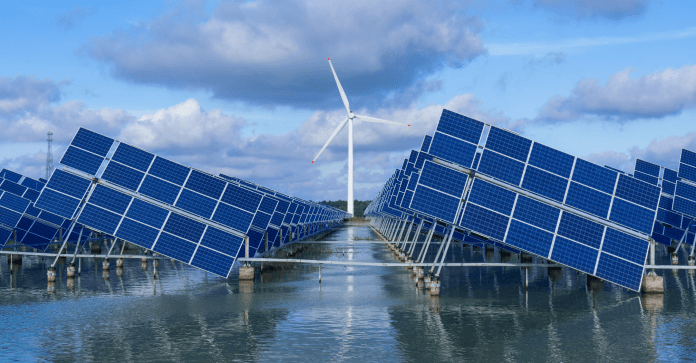Renewable energy has firmly cemented its position as the most cost-effective source of electricity generation globally, according to the Renewable Power Generation Costs in 2024 report released by the International Renewable Energy Agency (IRENA) today.
The findings highlight a significant and sustained cost advantage of renewables over fossil fuels, driven by technological innovation, competitive supply chains, and economies of scale.
In 2024, utility-scale solar photovoltaics (PV) were, on average, 41% cheaper than the lowest-cost fossil fuel alternatives, while onshore wind projects proved 53% cheaper. Onshore wind remained the most affordable renewable energy source at USD 0.034 per kilowatt-hour (kWh), followed by solar PV at USD 0.043/kWh.
The addition of 582 gigawatts (GW) of renewable capacity last year resulted in estimated fossil fuel cost savings of USD 57 billion. Significantly, 91% of all new renewable power projects commissioned in 2024 outcompeted any new fossil fuel option on cost.
“Clean energy is smart economics – and the world is following the money,” said UN Secretary-General António Guterres during a special address on July 22, 2025. “Renewables are rising, the fossil fuel age is crumbling. Leaders must now unblock barriers, build confidence, and unleash finance and investment.”
A Strong Business Case Amid Global Uncertainty
While the long-term outlook remains bullish, the report cautions against emerging challenges. Geopolitical tensions, trade tariffs, raw material shortages, and supply chain shifts—especially centered around China—pose short-term risks that may drive up costs temporarily. Europe and North America are expected to see persistent cost pressures due to structural hurdles like slow permitting processes, limited grid capacity, and higher system costs.
In contrast, regions like Asia, Africa, and South America are projected to benefit from faster cost reductions thanks to stronger learning curves and vast renewable resource potential.
“The cost-competitiveness of renewables is today’s reality,” said Francesco La Camera, IRENA Director-General. “Avoided fossil fuel costs from renewable operations in 2024 could reach up to USD 467 billion. But the pace and fairness of the transition depend on the choices we make now.”
Financing and Infrastructure: Keys to Scaling Up
IRENA’s report also delves into the structural cost drivers shaping renewable investments. Stable and predictable revenue frameworks are vital to reducing investment risks and mobilizing capital—especially in developing economies.
Power Purchase Agreements (PPAs), for example, remain critical tools in unlocking affordable financing. However, inconsistent policy environments and opaque procurement practices continue to undermine investor confidence in many emerging markets.
Integration costs have also surfaced as new bottlenecks. Increasingly, renewable projects are being delayed due to grid connection issues, slow permitting, and expensive local supply chains, particularly in G20 countries and fast-growing economies where infrastructure is lagging behind demand.
Financing remains a decisive factor. For example, while onshore wind costs in Europe and Africa were comparable in 2024 at around USD 0.052/kWh, the underlying cost structures differed vastly. African projects faced far higher financing costs, with assumed cost of capital reaching 12%, compared to just 3.8% in Europe.
Technology, Storage, and Digital Innovation
Beyond generation, advances in battery energy storage systems (BESS) and digital technologies are strengthening the case for renewables. The cost of utility-scale BESS has plummeted 93% since 2010, reaching USD 192/kWh in 2024. This has enhanced grid flexibility and performance, particularly when paired with hybrid solar-wind systems.
Artificial Intelligence (AI)-enabled solutions are also being deployed to optimize asset performance and grid responsiveness. However, the report stresses that investment in digital infrastructure and grid modernisation is urgently needed—especially in the Global South—to fully harness the benefits of renewables.
A Global Turning Point
In a speech marking the report’s release, UN Secretary-General António Guterres reiterated that the transition to renewables is not only inevitable but essential, offering enormous benefits for economies and communities alike.
“The energy transition is irreversible,” he said. “But its speed and fairness depend on whether the world comes together to support the Global South with finance, technology, and fair market access.”

